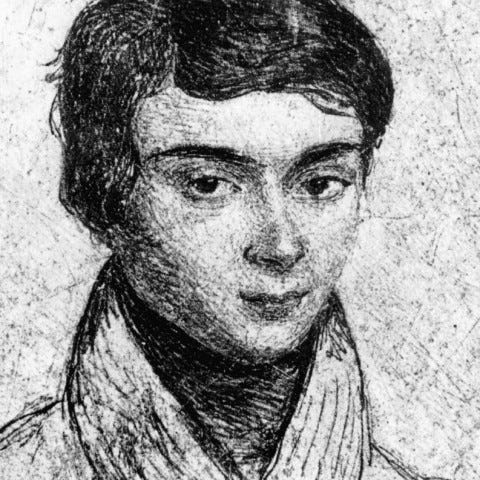We should make a movie about this mathematician
We should make a movie about Évariste Galois–a mathematics prodigy who died at 20 years old, 190 years ago.
It’s incredible to learn about the life stories of the engineers, artists, scientists, and inventors who shaped our world. These individuals went above and beyond the call of duty of the common person, probed the universe for new understandings about how things work, and then delivered us with the knowledge required to create many of the joys and luxuries of modern civilization.
Évariste Galois was a French mathematician who lived in the 19th century, from 1811 to 1832. Although he died at a young age of 20 (a kid in my book), he made some significant contributions to the field of mathematics, particularly in the study of algebra.
His most significant contribution to algebra was group theory. He developed a way of studying groups, which are mathematical structures used to describe symmetry. Galois' work on group theory helped to lay the foundations for the development of modern abstract algebra, which is now a major branch of mathematics.
One of the key insights that Galois had was to recognize that the structure of a group is determined not only by the individual elements themselves, but also by the relationships between them. He developed a way of studying these relationships using a set of rules called group axioms, which describe the properties that a set of elements must satisfy to be considered a group.
Galois' work on group theory has been used to study a wide range of mathematical structures, from number systems and geometric objects to particle physics and cryptography. It has also been used to study symmetries and transformations in fields such as chemistry, and computer science. Without group theory, some key progress in these fields would not have been possible.

Galois' Untimely Death
Despite his many accomplishments, Galois' life was short and tragic. He became involved in political activism as a teenager, and he was arrested and jailed several times for his activities. Eventually, he was killed in a duel at the age of 20, reportedly over a love affair.
Imagine being 20 years old, having already constructed theories of mathematics that would change the world forever, and then soon dying in a love affair-related duel?
Questions we should ask
Galois' life and legacy have had a significant impact on culture and history. His work has inspired many mathematicians to pursue new avenues of research, and his tragic death at a young age has made him a symbol of intellectual courage and dedication. Galois' life and work continue to be studied and celebrated by mathematicians and scholars around the world.
Yet, I strongly believe there is a lot we can learn from Galois’ story, as well as some of the other prodigies that emerged in his era, like Leonhard Euler, Carl Friedrich Gauss, Srinivasa Ramanujan, and Niels Henrik Abel.
What was it about this time period that enabled such an intense, almost romantic passion, for math and science?
I don’t have the answers, but I think it’s important we start improving our teaching strategies by asking these types of questions. I would also love to hear the thoughts readers of this article have on this question.
What can our education system of the future learn from Galois' story?
Please check out the educational movement we’re working on with The Nestomir–an educational fantasy story which introduces students to computer science as well as a brand new learning philosophy…and you can help create it through our open source initiative.
Steven Reubenstone


